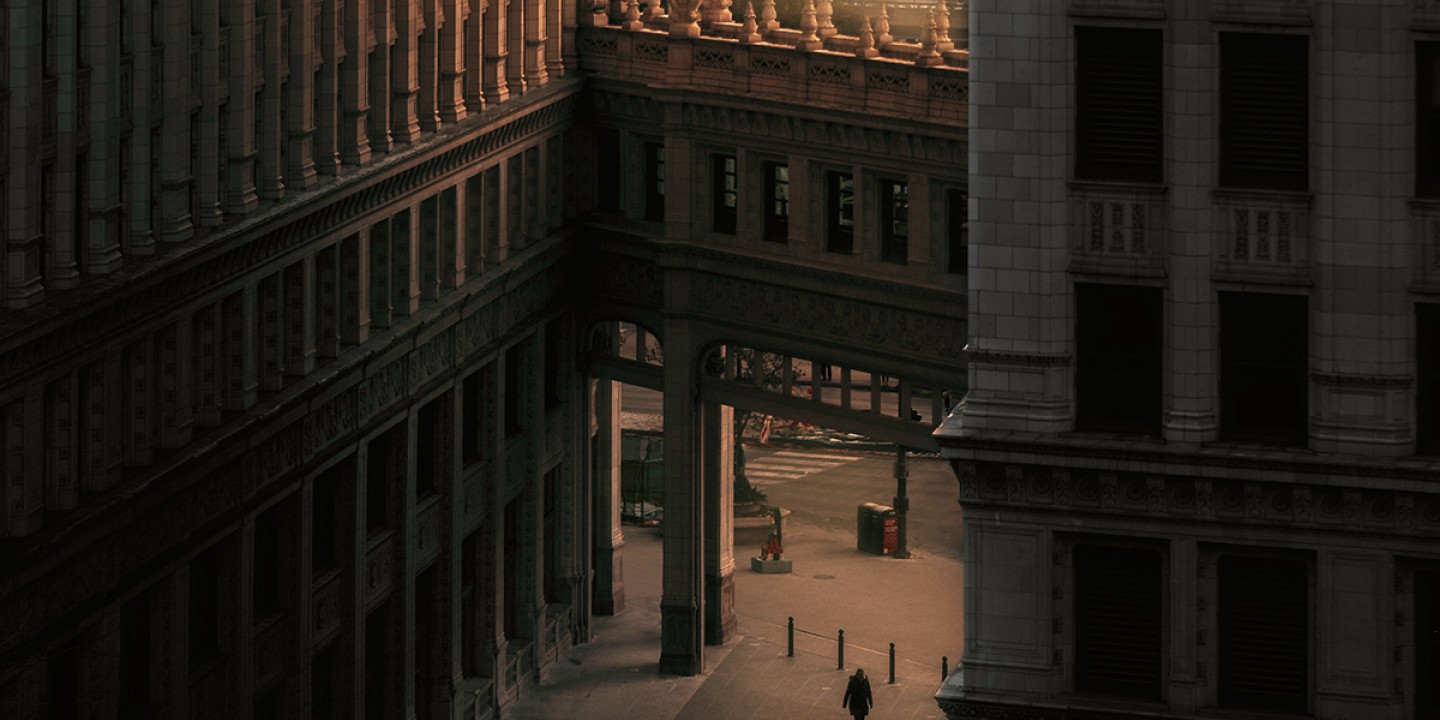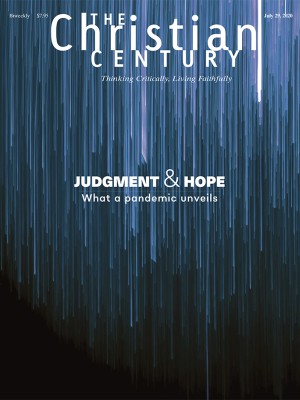What if COVID-19 changes nothing?
People keep saying we’ll be forever transformed by this pandemic. I’m skeptical.

My April issue of Rolling Stone arrived in the mail several weeks after the COVID-19 lockdown went into effect. It seemed unfortunate, looking at the cover and glancing through the stories inside, that the turnaround on print publishing is so slow. Every article seemed out of step with current realities. The magazine focused on what it described as an emergency—not the pandemic, but climate change. While I would in no way dispute the urgency of climate change, it was hard to see it as being anywhere other than on the back burner of our minds at that moment.
The more I thought about it, however, the more that I realized that what Rolling Stone offered me with its slower news cycle was an important perspective on what this pandemic might need to teach us. This particular issue of the magazine opened some theological insight for me about the hope and challenge of Christian apocalyptic thinking.
Read our latest issue or browse back issues.
I keep hearing two competing ideas from people. On the one hand, there are all of those anxious questions about when we can expect to get “back to normal.” This question is tied closely to our collective concern for the economy, as well as our visceral desire to reach out and physically touch one another.
On the other hand, people confidently state that we will be forever changed by this crisis. These months of fear and seclusion will shape us, it is said, in much the same way that World War II shaped my grandparents’ generation. I sense longing in these voices. It is appealing to temper our current difficulties by imagining the future prospect of being made stronger, of becoming more united and less petty. This lends a nobility to our suffering, as if we can almost see in the mind’s eye the great books and epic movies that will be created to tell of these heroic days which, right now, feel so muddled and chaotic.
I’m skeptical, however. “We’ll be different after this”—we have said this in response to 9/11, to mass shootings, to floods and hurricanes and forest fires, to the slaying of unarmed black men by police. And then we keep operating as if each of these events hasn’t clearly spoken into the business-as-usual of our lives and demanded a response.
We keep shopping and driving and burning forests and fueling extremism and overlooking systemic racism and polluting the ocean and throwing out plastics and pumping our skies full of carbon, as if all of these behaviors should be able to go on unchecked. We live as if we’re separate beings who get to set the rules about how we’ll exist in creation. We terrorize the very fabric of relationship on which our lives are built—until it all collapses in one telling disaster. Then we pick ourselves up and continue on as before.
I’m convinced that the most terrifying possibility in all of this isn’t that we’ll be restricted in our activities for the next year, that our travel and economy will be disrupted for longer than we would like, or even that COVID-19’s death toll will continue to rise. The most terrifying possibility is that this pandemic won’t change anything in any lasting way.
That’s where I ultimately found resonance in the Rolling Stone issue on climate change. It was a clear reminder that this pandemic comes to us within a bigger framework of life on this planet. As each page makes clear, the way that we are living on this planet is unsustainable. The systems of relationship within which we live will answer back. COVID-19 must be heard as what it is: life on this planet having its say.
And within that claim is a complementary claim for people of faith: in these circumstances, we must also listen for what God is saying.
I am not suggesting that God is using this disaster to test us; nor is my point to read the riot act on the particular sins I find most offensive.
I am saying that the God of Christianity—revealed as trinitarian relationship, known to us through the relational act of breaking bread together, loved and served by us only insofar as we love and serve the bonds of relationship between us—has made it abundantly clear that we are here on this planet as beings who are inextricably bound to one another. If we try to live as if we can choose to override these bonds of relationship, then we should expect life to go awry.
There is another voice I’ve heard consistently in all of this—particularly at the beginning, when the shock of empty streets, closed shopping centers, and boarded-up restaurants felt the most significant. “It’s like the apocalypse out there,” people said. What they meant by this word was mostly shaped by Hollywood. It looks like the sort of epic disaster that will shuttle us into the end times.
Yet that misused word apocalypse actually gets at the necessary truth we must claim from this global pandemic. The word in fact means “to unveil” or “to reveal.” The most famous apocalypse, the book of Revelation, isn’t a prediction of future events. It is a pulling back of the curtain on current times—John’s current times and, through the living power of scripture, ours as well—to describe the spiritual truth of what is happening.
Media theorist Marshall McLuhan was once asked whether he was optimistic or pessimistic about the future. His insightful response reflected the conviction of his Christian faith: “I am not an optimist or a pessimist. I’m an apocalyptic.” Christians have always been invited to consider apocalyptic thought as fundamentally hopeful. It is a stripping away of the lies we tell ourselves, a revealing of what is true—and then it is a call to change. It is the affirmation that we have the God-given capacity to turn our lives away from the lies and back toward that truth.
Horrifying and beautiful truths are being revealed to us in these apocalyptic days of COVID-19. We are seeing the gross injustices of our social systems brought to the forefront—and whereas we might normally fail to see or act on these injustices, this time we finally realize that the well-being of all of us depends on the well-being of each of us. We can’t pretend that the way we treat the vulnerable among us doesn’t affect the rest of us too.
We are seeing, all across our world, that humankind does have the capacity to act collaboratively and to change radically in response to an emergency situation. While some political leaders have paralyzed much-needed response efforts, there are also shining examples of whole countries working together swiftly and responsibly to save lives. Wealth can be distributed more justly, our carbon footprint can be reduced, a living wage can be guaranteed, housing can be found for the homeless, value can be affirmed in labor that we have too often overlooked, and the seemingly entrenched routines and systems of our collective life can be upended in a moment when it becomes clear that we have an emergency on our hands.
In fact, the same truth of the environmental emergency issue of Rolling Stone is being affirmed in the physical distancing measures imposed by this pandemic. On the level of global weather systems and on the level of microscopic viral life, we are inextricably physically connected to one another. The air I breathe out must eventually become the air that others breathe in. No new physical matter is ever being made; we just keep recycling water and oxygen and energy and matter between the bodies of all living things. Physical distance allows this exchange of resources to happen without also exchanging the COVID-19 virus. Physical distancing makes unavoidably clear a truth that our rampant individualism would often rather ignore: there is no way to live merely for ourselves. Each of our choices affects our whole planet’s well-being.
In this dramatic accounting of biological truth comes spiritual truth too. The hamster wheel of busyness, productivity, and economic growth has been halted. We can see that our salvation doesn’t come from that hamster wheel. In that moment where false idols crumble, surely we’re able in a new way to seek and serve the God who will always break open the boxes in which we try to contain and manage the divine, who promises to be at work in the dark tombs of our lives, answering death with new life.
And in our willingness to seek (or be sought) by the wild and surprising power of God, there comes this COVID-19 revelation as well: we can choose. We can choose to align our lives with the God of compassion and healing. Or we can choose to keep trying to cobble together the teetering house of cards that is this claim that we can operate outside of the bonds of relationship. We can choose, but the truth that one of these paths leads nowhere but to death is now impossible to ignore.
From well before Jesus’ own apocalyptic visions—of war and famine, darkening skies, changing weather patterns, and the temple of Jerusalem reduced to rubble—people of faith have heard God’s promise of ultimate revelation with hope. It is a hope founded in knowing that we won’t be bound by the lies forever; truth and transformation will be made visible and possible. These are apocalyptic days, days of tragedy and terror and truth. When an effective vaccine is distributed and this pandemic is lifted, the worst thing that we could do in response is just go back, unchanged, to our normal lives.
A version of this article appears in the print edition under the title “After the unveiling.”





